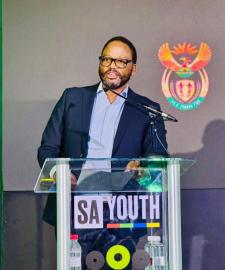
Employment and Labour Deputy Minister, Jomo Sibiya, has underscored the importance of youth employment and economic inclusion as essential elements for South Africa's future success.
The Deputy Minister was delivering a keynote address at the Solutions Exchange Conference held at The Forum in Bryanston, Johannesburg.
Sibiya told the leaders from government, business and civil society that the gathering was testament to the fact that they believe in the potential of the youth to contribute meaningfully to their lives, communities and the South African economy.
The Deputy Minister highlighted the need to provide opportunities for the country's youth to thrive, both economically and socially.
“It is both an honour and a privilege to stand before you at this auspicious occasion, dedicated to finding solutions to one of the greatest challenges that South Africa faces. A challenge that I do not doubt can be overcome together.
“Youth employment and economic inclusion are vital to the success of our country. In young people, we see the potential for the South Africa we want. They are the doctors, lawyers, business people, teachers, and artisans that will ensure the growth and development of our country not just in the short term, but for generations to come,” the Deputy Minister said.
He emphasised that building a future-proof workforce that is able to innovate and solve the country’s most pressing challenges is not something that should be merely done but a must.
“A working nation is a peaceful nation, and by supporting the youth of South Africa to access the labour market and contribute meaningfully to our growth and development, we are in fact, ensuring that South Africa enjoys the stability required to prosper, untied,” he said.
Sibiya pointed out the stark challenges youth face in the job market, where about 60% of young people are either unemployed or not in education or training.
He highlighted that among South Africans aged 20, the unemployment rate is over 70%, while for those with tertiary education, 25% still struggle to find work. Young women face even greater challenges, with unemployment rates nearly 10% higher than their male counterparts.
“As the Department of Employment and Labour, we understand that the challenge of youth unemployment is complex and multifaceted, and that there are a number of factors that we need to be cognisant of when attempting to address youth unemployment at scale.
“We know that age matters: [the] unemployment rate for 20-year-olds is double that of 40-year-olds (70% vs 35%). This means that we have to get employers across the board to shift mindsets and attitudes towards hiring young people, while supporting youth themselves to gain work experience and the right skills required to be absorbed into the labour market,” the Deputy Minister said.
The Deputy Minister cited the Presidential Youth Employment Initiative (PYEI) as a central effort to combat youth unemployment. Through collaboration between government, the private sector, and civil society, the PYEI seeks to ease young people's transition from learning to earning by providing job opportunities, skills training, and support for young entrepreneurs.
The initiative’s SA Youth platform, Sibiya noted, has registered over 4.1 million young South Africans, offering a range of opportunities matched geographically to reduce transportation costs and improve accessibility.
The PYEI closely integrates with other interventions coordinated by the Presidency, including Operation Vulindlela which is implementing key structural economic reforms that has unlocked growth and jobs and the Presidential Employment Stimulus (PES) which has delivered over two million jobs and opportunities. Of this, over 80% went to young people, the majority of whom applied through SA Youth.
“Imagine a young person in a rural community, much like the one I grew up in. With the right support, she could transition from being a student in an under-resourced school to leading a team at a major tech company. Her success would create a ripple effect, opening doors for others in her community. This is the transformative power of public-private partnerships,” the Deputy Minister said.
In addition to the PYEI, Sibiya emphasised the department’s commitment to transformative employment legislation, including the Labour Relations Act and Employment Equity Act, aimed at creating fairer working environments and promoting diversity.
Furthermore, Sibiya underscored the department’s strides in skills development through the Skills Development Act, which has established Sector Education and Training Authorities to help bridge the skills gap.
“At the Department of Employment and Labour, we are dedicated to promoting broad-based black economic transformation, youth development and training, and fostering greater collaboration between the public and private sectors. Our efforts are grounded in the belief that these partnerships are the most effective means to create inclusive growth that benefits all South Africans.
“As we face the complex realities of unemployment and economic inequality, it is crucial that we adopt a multi – sectoral approach,” he said.
The Deputy Minister reiterated that a collective effort was essential to addressing youth unemployment.
“Success in the area of youth employment will require collaboration and a shared belief system on how deeply corrosive it is for young people to witness economic activity but be barred by some or another external barrier, from participating in it.”
He said this was why initiatives like the Solutions Exchange were crucial for bringing together diverse, like-minded voices and fostering collective ownership of the challenge.
“It is the brains trust in this room who are creating the conditions for meaningful, long-term change in our country I look forward to working with all gathered here today, as we commit to transforming the South African employment landscape and restoring the dignity of employment amongst our youth, together,” Sibiya said. – SAnews.gov.za


